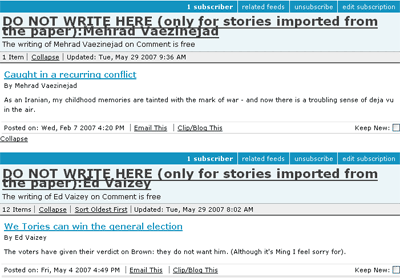Bloglines subscriptions numbers and OPML file for The Guardian's Comment Is Free site
I've mentioned a couple of times in the last few weeks the debate about whether The Guardian is entitled to call their "Comment Is Free" site a 'group blog', or whether it is just a random assortment of opinion columns from the paper held together by a handful of regular contributors.
What can't be doubted is that the site presents itself in a very richly featured blog format, which includes the provision of RSS feeds on a per author basis.
The feeds aren't perfect, as can be seen from this Bloglines screenshot. It looks like some internal content management instruction ends up being written out into the <title> tag of the XML output.
DO NOT WRITE HERE (only for stories imported from the paper)

Whilst the site includes a page alphabetically listing contributors, it doesn't appear to list anywhere the addresses of all the RSS feeds. Instead, the Comment Is Free RSS help page states:
The latest 15 stories posted by individual authors are also available as separate webfeeds.
These are available by via the individual author's archive or profile pages, linked to from the Contributors' A-Z
Or, you can guess the url yourself. They come in the form http://commentisfree.guardian.co.uk/firstname_lastname/index.xml
Since I wanted to do some analysis of the feeds, the easiest way for me to subscribe to them all was via a bulk OPML file. With one not being available directly from the newspaper, I cobbled one together using some Excel jiggery-pokery. [1]
You can download it here.
It is a monster of a file, with 1,968 RSS feeds listed in it, although I'm quite sure it went out of date almost as soon as I made it, which was a month ago now.
I haven't cleaned it up much, but it does seem to import into a feed reader fine. I notice the alphabetical sort is rigidly on the last part of a name. That means 'Election Night Live' is under 'L', whilst 'Alan Johnson MP' and 'Volker Perthes and Freideman Müller' are both under 'M' for varying reasons.
Having subscribed to all these feeds in Bloglines, I was able to have a look at the public subscription numbers for them. Charlie Brooker is leading the Comment Is Free popularity stakes amongst Bloglines users by some considerable distance.
| Pos. | Comment Is Free author | Bloglines Subscribers |
| 1. | Charlie Brooker | 118 |
| 2. | Sue Blackmore | 18 |
| 3. | Daniel Davies | 16 |
| 4. | Timothy Garton Ash | 13 |
| 5. | David Boaz | 12 |
| 6. | John Pilger | 12 |
| 7. | George Monbiot | 10 |
| 8. | Jon Ronson | 10 |
| 9. | Emily Bell | 9 |
| 10. | AC Grayling | 9 |
| 11. | Polly Toynbee | 9 |
| 12. | Andrew Brown | 8 |
| 13. | George Galloway | 8 |
| 14. | Simon Jenkins | 8 |
| 15. | Tony Juniper | 8 |
Subscription figures across the board were pretty low. Only 34 authors out of the 1,968 feeds had attracted 4 or more subscribers in Bloglines.
Some heavyweight political figures were unloved. I'm sure Tony Blair would be dismayed to know that he and Gerry Adams (1 subscriber each) were both being out-performed by Ken Livingstone (2 subscribers), and all of them were in the shadow of 'hard-working' MP and Celebrity Big Brother housemate George Galloway.
A couple of names from The Guardian's ranks of regular contributors also performed worse than I would have expected. Michael White, Marina Hyde and Ben Hammersley could only muster five subscribers between them, whilst Noam Chomsky only had three regular readers in Bloglines.
Of course, just because subscriber figures are low on one platform doesn't mean it isn't worthwhile publishing the individual feeds. Once you've set up the templates, the production costs to publish the content in XML as well as in HTML is negligible, so if you are doing the latter, you may as well do the former as well.
I'm sure The Guardian would also want me to point out that the aggregate feed of all Comment Is Free content was the fourth most popular feed in Bloglines amongst all the newspaper blog feeds I looked at last week, with in excess of 400 subscribers.
I'd like to do some more analysis on these feeds, which might help fuel the debate about the nature of the site. I'm interested in the freshness and depth of the content being produced by each author. I'd love to see how many of the feeds have had new content in the last week / month / six months / year, and how many of them only feature one, two or three articles.
However, that will definitely require the dusting off of my Learning Perl book - so don't hold your breath!
![]() Comment Is Free per author RSS feeds - May 2007
Comment Is Free per author RSS feeds - May 2007
[1] This is a technical term which indicates that I know it would have been easier to do this with even my rusty Perl and Regular Expressions than doing it in Excel. However when my connection to my Linux box in London is over a 32kbps dial-up connection, doing it the clumsy spreadsheet way was going to be quicker in the long-run. [Return to article]